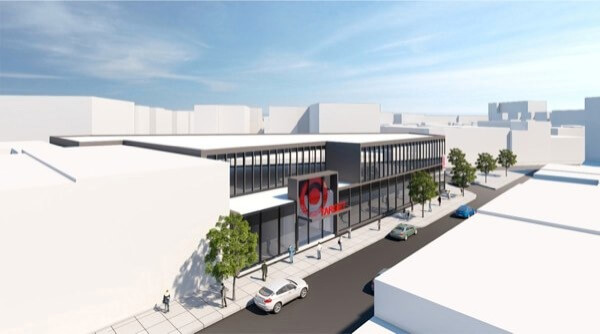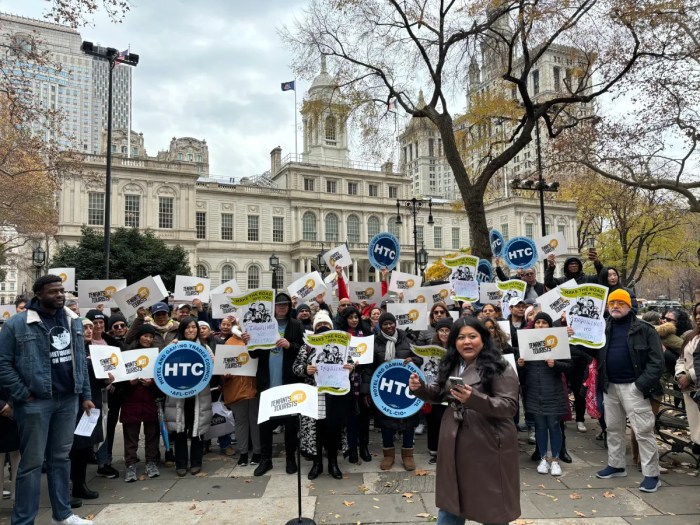By Mark Hallum
Activists were celebrating a victory over developers following the announcement Sun Equity would withdraw its rezoning application for a 13-story partial affordable housing structure in Elmhurst with Target on the ground level.
Under the current zoning, Sun Equity can still build 10 stories of housing and the retail space, but would no longer be required to fulfill any inclusionary housing requirements, according to a spokesman for Councilman Francisco Moya (D-Corona).
The ULURP application, already approved by the City Planning Commission, allows the developers to build 13 stories instead of 10 on an empty lot at 40-31 82nd St., which would feature 40 percent affordable housing units and a Target center.
Democratic State Assembly candidate Catalina Cruz has long opposed the project because of the supposed danger it poses to patients at Elmhurst Hospital.
“As proposed, the new construction would have endangered the lives of the people in our community by blocking ambulances from getting to Elmhurst Hospital, jeopardized small businesses, and potentially raised the rent on tenants in the surrounding area,” Cruz said. “Our community remains in dire need of affordable housing, but it should never come at the expense of our safety. The developer now has the responsibility of engaging the community moving forward. We must ensure that the voices of our neighbors and small business owners are heard.”
Cruz is in the running against Assemblywoman Ari Espinal (D-Jackson Heights), who only won her seat in the Legislature in April.
“Today, we can honestly say that we have won the first battle, but this fight is far from over,” said Espinal. “This was never the right proposal for our neighborhood, and we need to keep the pressure on to stop the retail development that will increase traffic and congestion in our community… The fact that something is ‘as-of-right’ doesn’t make it morally right,” she said. “A giant Target and a parking garage in the middle of our neighborhood will mean too much traffic, more dangerous streets, and real health care crises if ambulances are delayed from reaching Elmhurst Hospital due to congested streets.”
Queens Neighborhoods United, an anti-gentrification organization, played a part on the front lines of opposition to the proposal by sending protesters to public hearings and organizing rallies and press conferences highlighting the damages feared from the project.
City Planning Commission Chairwoman Marisa Lago told Politico that although permits for the rezoning would not be pursued, the community could be left without any affordable housing in the deal.
“The Target would still be built,” she said. “There would be housing built, none of it affordable, and it would be an as-of-right development, with no public review.”
The proposal has caused a stir in the community where many attendees at various meetings discussed being priced out of the neighborhood as it is and that the proposal did not have deep enough affordability with only 40 percent of units meeting a $40,000-a-year household salary.
The community expressed fears that Target would run the many immigrant-owned mom-and-pop shops into the ground as well with many echoing the phrase “Target is the new Walmart.”
The housing development proposal has been through the ringer after being rejected by Community Board 2’s zoning committee and later rejected by the rest of the advisory board members almost unanimously at its general meeting in March.
As the proposal made its way to a hearing for an advisory decision from Borough President Melinda Katz, she recommended that the City Planning Commission approve the zoning change on the condition the developers maintain a minimum of 30 percent affordable units, manage traffic congestion and that the Target outlet on the ground floor hire only neighborhood residents.
Although Moya and Espinal said the plan was not ideal for the community and had originally been supported by the previous Council member, Julissa Ferreras-Copeland strongly denied the claim.
“I never supported the 82nd Street re-development as currently proposed,” Ferreras-Copeland said. “I met with the developer twice to encourage them to build a school or a community center in 2016 and early 2017. Unfortunately, the developer did not pursue either option which would directly benefited the community.”
Reach reporter Mark Hallum by e-mail at mhall





































